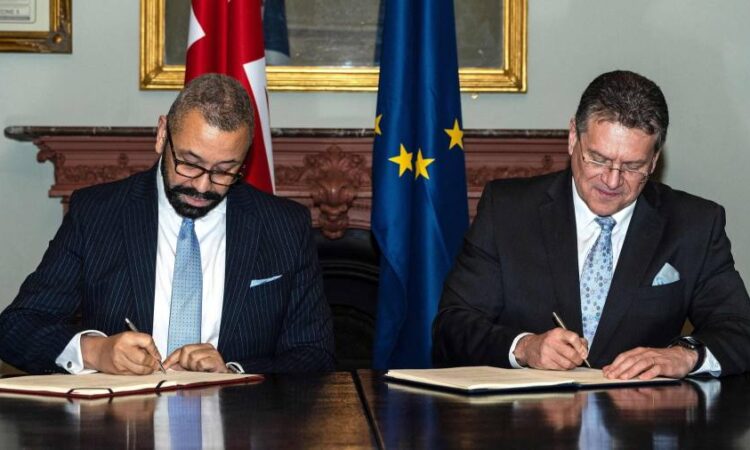
Britain and the EU formally adopted a post-Brexit deal on Northern Ireland on Friday, ending months of tensions on the issue and opening the door for closer co-operation between the two sides.
James Cleverly, UK foreign secretary, and Maroš Šefčovič, European Commission vice-president, signed off the so-called Windsor framework at “constructive” talks in London.
Cleverly said the deal on Northern Ireland’s trading arrangements would open the way for “further effective co-operation with the EU on key issues, such as security and energy”.
In a joint communiqué, both sides agreed to “take forward discussions” on Britain taking part in some EU programmes, notably the EU’s €95bn Horizon research programme, and the Euratom nuclear co-operation deal.
Rishi Sunak, prime minister, is still considering whether Horizon represents value for money, but British participation is highly valued by universities and scientists.
MPs on Wednesday voted by 515 to 29 to approve a key part of the Windsor framework, the so-called Stormont brake, which gives the Northern Ireland assembly a say over new EU goods laws.
The deal, which aims to streamline border processes on trade between Great Britain and Northern Ireland and address the “democratic deficit”, has also been approved by EU member states.
The Democratic Unionist party continues to oppose the revamped Northern Ireland protocol and has refused to return to the region’s Stormont assembly, but the deal will take effect anyway.
Ministers hope that the DUP will lift its boycott of Stormont later this year, possibly after local elections in May. “They need time and space,” a senior UK government official said.
Cleverly and Šefčovič said they were looking for ways to build on the “excellent co-operation” that saw both sides agree a compromise last month in Windsor to end the simmering dispute.
They confirmed plans to develop work on securing energy supplies, including new electricity trading arrangements, and said they would soon sign a memoranda of understanding on financial services and intellectual property.
They also discussed areas of friction, including Britain’s plan to rip up swaths of EU law by the end of the year, a move which Brussels fears could distort the level playing field for trade.
Both sides have also agreed to co-operate over Ukraine and to help stem the flow of illegal migration across the continent.
Sunak’s resounding House of Commons victory on the Windsor framework this week is being seen by some moderate Tory MPs as a watershed moment in Britain’s post-Brexit relations with the EU.






